Related Research Articles

David Warren Brubeck was an American jazz pianist and composer. Often regarded as a foremost exponent of cool jazz, Brubeck's work is characterized by unusual time signatures and superimposing contrasting rhythms, meters, tonalities, and combining different styles and genres, like classic, jazz, and blues.
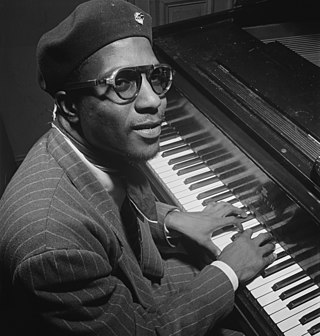
Thelonious Sphere Monk was an American jazz pianist and composer. He had a unique improvisational style and made numerous contributions to the standard jazz repertoire, including "'Round Midnight", "Blue Monk", "Straight, No Chaser", "Ruby, My Dear", "In Walked Bud", and "Well, You Needn't". Monk is the second-most-recorded jazz composer after Duke Ellington.

Hadda Brooks was an American pianist, vocalist and composer, who was billed as "Queen of the Boogie". She was Inducted in the Rhythm and Blues Foundation Hall of Fame in 1993.
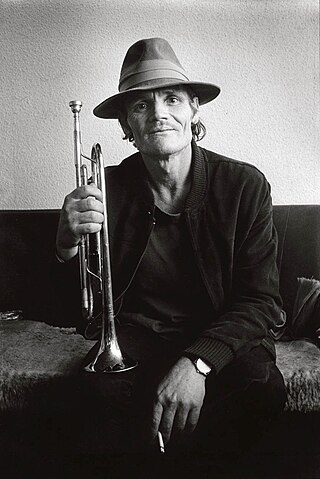
Chesney Henry "Chet" Baker Jr. was an American jazz trumpeter and vocalist. He is known for major innovations in cool jazz that led him to be nicknamed the "Prince of Cool".
Maude Amber McAfee-Maggart is an American cabaret singer and recording artist who performs throughout the United States and Europe, but most often in Los Angeles, San Francisco, and New York City.

Michael Jay Feinstein is an American singer, pianist, and music revivalist. He is an archivist and interpreter for the repertoire known as the Great American Songbook. In 1988, he won a Drama Desk Special Award for celebrating American musical theatre songs. Feinstein is also a multi-platinum-selling, five-time Grammy-nominated recording artist. He is the artistic director for The Center for the Performing Arts in Carmel, Indiana.

A piano bar consists of a piano or electronic keyboard played by a professional musician as a central part of an establishment that also serves alcoholic drinks. Piano bars can be located in a cocktail lounge, bar, hotel lobby, office building lobby, restaurant, or on a cruise ship. Usually the pianist receives a small salary plus tips in a jar or basket on or near the piano, especially from patrons requesting a song. Such requests are traditionally written on a beverage napkin. Some piano bars feature a baby grand or grand piano surrounded by stools for patrons. Others have a bar surrounding the piano or keyboard.
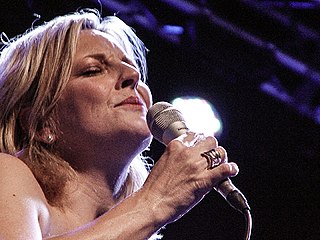
Claire Martin, OBE is an English jazz singer.
Russ Lorenson is an American singer and actor. Though a stage actor since childhood, since the mid-2000s Lorenson has established a reputation as an interpreter of jazz standards. With a retro crooner style, Lorenson's sound and approach are an amalgam of Broadway, jazz, and pop.

Connie Champagne, née Kelly Kay Brock,, is an American singer, songwriter and actress. She won the SF Weekly Wammie Award for Outstanding Cabaret Performer. She is known for performing the character of actress Judy Garland in productions including Christmas With the Crawfords in 2001 and Imagine Judy Garland: An Evening With Connie Champagne in 2003. She won a 2007 San Francisco Bay Area Theater Critics Circle Award (BACTC) for her role in Goodbye Yellow Brick Road. Despite fierce competition by acclaimed Broadway actors including Phylicia Rashad, Champagne also earned Los Angeles' Ovation Award for Outstanding Performance by an Actress in A Musical, Judy's Scary Little Christmas, directed by Kay Cole. Specializing in numerous styles of music and theater including cabaret, swing, jazz, rock and roll, and musical theater, Champagne has performed in numerous venues throughout the US and Europe.
Mary Stallings is an American jazz vocalist and mother of soul singer Adriana Evans.

Sylvie Courvoisier is a composer, pianist, improviser and bandleader. She was born and raised in Lausanne, Switzerland, and has been a resident of New York City since 1998. She won Germany’s International Jazz Piano Prize in 2022 and was named Pianist of the Year for 2023 in the international critics poll of Spanish jazz publication El Intruso. NPR’s Kevin Whitehead has encapsulated the distinctive character of Courvoisier’s art this way: “Some pianists approach the instrument like it’s a cathedral. Sylvie Courvoisier treats it like a playground.”
Howard Fishman is an American author, culture writer, singer, guitarist, bandleader, playwright, and composer from Brooklyn, New York. Since 2016, Fishman has been a contributing writer for The New Yorker. His writing has also appeared in The New York Times, Rolling Stone, The Washington Post Magazine, The Boston Globe, Artforum, Vanity Fair, San Francisco Chronicle, MOJO, and No Depression.
KT Sullivan is an American singer and actress known for her performances in cabaret and musical theatre.
Eli Degibri is an Israeli jazz saxophonist, composer, and arranger.
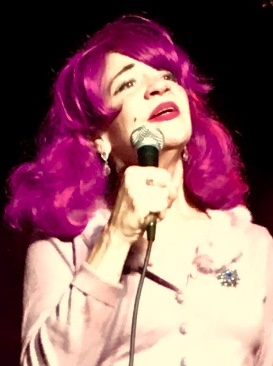
Susan Dimiti "Suzy" Williams is an American singer-songwriter. She became well known through the musical duo Stormin’ Norman & Suzy. Williams has performed at venues ranging from Carnegie Hall and Lincoln Center to the Hotel Palmas in the Canary Islands, and on network television and film. She has been reviewed in publications including Rolling Stone, The New York Times, Cosmopolitan, and Los Angeles Magazine. Her singing was referred to in Rolling Stone as a "mixture of Bessie Smith, Sophie Tucker, and perhaps a trace of Janis Joplin".

John Frank Oddo was an American jazz pianist, composer, and arranger. He is most notably associated as pianist and musical director for Woody Herman, Rosemary Clooney and Michael Feinstein.

Wesla Whitfield was an American singer who recorded more than a score of albums and performed at Carnegie Hall and the White House, among other sites. She used a wheelchair for the last four decades of her life, after surviving a gunshot injury. She specialized in the American standards genre of music.
Mary Cleere Haran was an American singer known for her work as a cabaret artist. Her skills in performing popular music and jazz enabled her to entertain audiences with either genre or a combination of the two. A review in the magazine Variety described her as having "an easygoing earthiness that glows in the velvet textures of her voice ..."
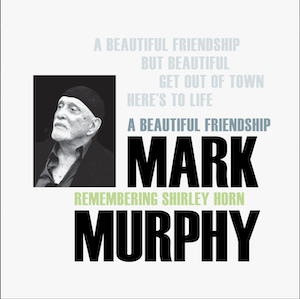
A Beautiful Friendship: Remembering Shirley Horn is an EP by Mark Murphy.
References
- ↑ Price, Gene (2005-02-24). "Vivacious Paula West Captures Jazz Scene". San Francisco Bay Times. Retrieved 2010-02-07.
- ↑ "Paula West". All About Jazz. Archived from the original on 2009-04-29. Retrieved 2010-02-07.
- 1 2 "Margo Jefferson on Paula West", liner notes to Paula West, Come What May (2001).
- ↑ Seida, Linda. "Paula West". AllMusic. Retrieved 13 September 2019.
- ↑ "Reflections with Philip Elwood and Sheila Jordan", liner notes to Paula West, Temptation (1997).
- ↑ "Appearing Now". Archived from the original on February 26, 2007. Retrieved March 5, 2007.
- ↑ "BBC World News Presents". Archived from the original on 2008-09-09. Retrieved 2008-09-02.
- ↑ Holden, Stephen (October 29, 2004). "A Touch of Jazzy Mischief Updates Dylan With a Rap Inflection". The New York Times. Retrieved May 22, 2010.
- ↑ Holden, Stephen (October 22, 2007). "A Cheeky Cabaret Voice Sings the Set Eclectic". The New York Times. Retrieved May 22, 2010.
- ↑ Pierce, Tom (31 July 2012). "Paula West: Live at Jazz Standard". All About Jazz. Retrieved 13 September 2019.